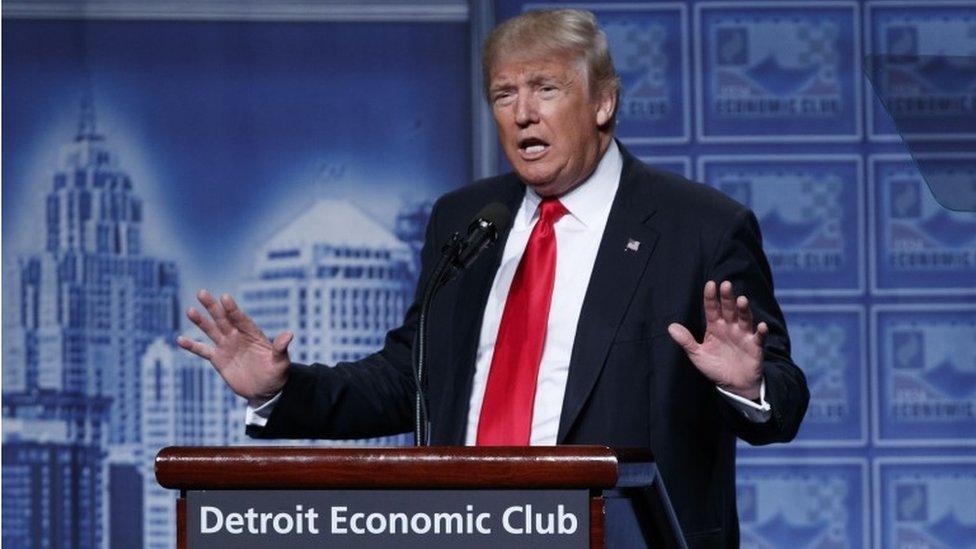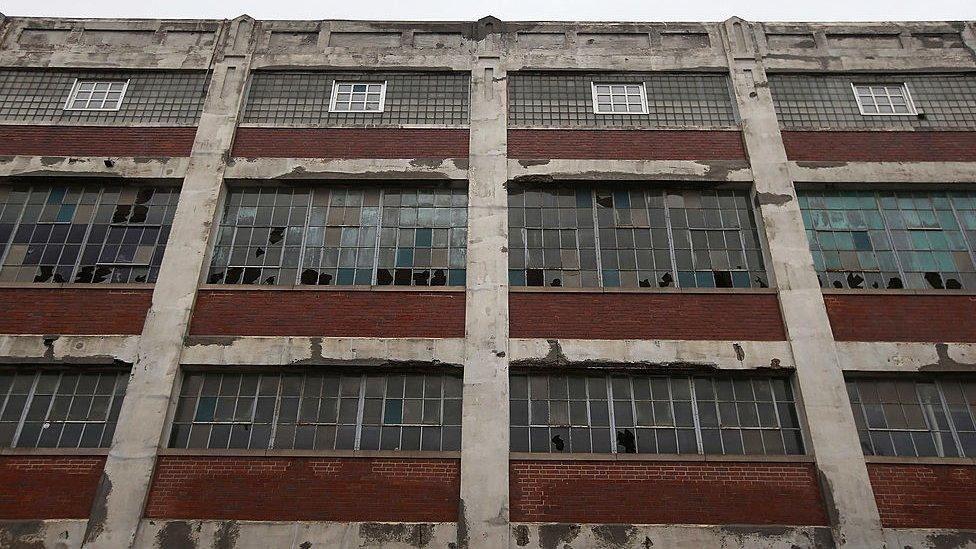Trump aims to 'jump start' America with new tax plan
- Published

Mr Trump says he wants to issue a moratorium on new agency regulations
Republican presidential nominee Donald Trump plans to "jump start" the US economy by suspending new regulations and cutting corporate taxes.
The real estate mogul revised his former plan to include making child care costs tax-deductible and ending the estate or "death" tax.
"I want to jump-start America and it can be done and it won't even be that hard," he said.
Several protesters interrupted Mr Trump's speech in Detroit, Michigan.
The campaign aimed to shift focus to economic issues, seen as one of the candidate's strengths, after a bruising week on the campaign trail.

Analysis: Anthony Zurcher, BBC North America Reporter
Donald Trump delivered a boilerplate conservative economic speech with a Trumpian twist, grafting his opposition to trade deals and support for expanding childcare deductions onto more traditional calls for lower taxes and reduced regulation.
With Mr Trump haemorrhaging support among white-collar Republicans, his efforts seem aimed at attracting these business-friendly conservatives while keeping his working-class supporters happy. It is a fine line to walk.
Conservative bean-counters may wonder how Mr Trump plans to pay for his proposals. And when he promised to renegotiate Nafta and possibly provoke a trade war with China, the audience of Detroit-area businessmen offered only tepid applause.
Mr Trump's blue-collar supporters may question whether ending an estate tax that only applies to inheritance over $10m (£7.63m) per couple should be a priority. They may also notice that the campaign's list of economic advisers is heavy on billionaire donors with Wall Street ties.
Mr Trump was most passionate about his economic nationalist message, concluding with a rallying cry for American workers to do American jobs. It's a pitch that may work in the industrial Mid-west. The test will be whether he can stay on message in the coming days and make the case for Trumpenomics.

Speaking at the Detroit Economic Club, Mr Trump's retooled tax policy offered little details on how he planned to fund it.
But the new proposal included lowering corporate taxes, placing a 15% cap on all business income tax and raising the top individual tax rate to align with a House Republican plan.
Last September, Mr Trump proposed individual tax rates of zero, 10, 20 and 25%.
On Monday, he proposed reducing the number of tax brackets from seven to three at the tax rates of 12, 25 and 33%.
He also mentioned eliminating special interest loopholes such as the carried-interest deduction, which he said allows Wall Street investors -including himself- to pay a lower tax rate on earnings.
Mr Trump used the major address to attack Democratic rival Hillary Clinton, insisting the city of Detroit was a "living, breathing example of my opponent's failed economic agenda".
"She is the candidate of the past," he said. "Ours is the campaign of the future."
Mrs Clinton, who will unveil her economic plan later this week, quickly pushed back against Mr Trump's plans.
"Donald Trump's plan is just a repackaging of trickle-down economics — and it doesn't help our economy or the vast majority of Americans," Mrs Clinton said on Twitter.

The Trump campaign is courting voters in states hit hard by a downturn in US manufacturing
Mr Trump also emphasised his opposition to the Trans-Pacific Partnership trade deal and his pledge to renegotiate the North American Free Trade Agreement (Nafta).
During his campaign, Mr Trump has promised to restore jobs to the US manufacturing sector after decades of decline.
His campaign is making a big push for voters in the so-called "Rust Belt" - Midwestern and Eastern states such Pennsylvania, Ohio and Michigan that were once manufacturing powerhouses.
Mr Trump neglected to mention spending cuts, infrastructure spending, entitlements, military spending or debt negotiation, all of which are issues he has previously mentioned.
Critics say Mr Trump's plan and previous statements - a combination of spending increases and tax cuts - would cause the federal deficit to skyrocket.

More on US election 2016

Mr Trump has seen his poll numbers plummet against Democrat nominee Hillary Clinton in recent days.
Last week, Mr Trump feuded with a military family who spoke at the Democratic National Convention as well as with members of his own party.
He also appeared to support Vladimir Putin's annexation of Crimea.
Hoping to put last week's controversies behind them, Mr Trump's advisers are looking to "reset" the campaign with more focus on policy.
Polls have shown Mr Trump does well with voters on economic issues such as job creation and trade.